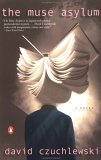Summary | Excerpt | Reviews | Readalikes | Genres & Themes | Author Bio

Critics' Opinion:
Readers' Opinion:
First Published:
May 2001, 240 pages
Paperback:
Apr 2002, 240 pages
As the trip goes on, the mother continues to point out the world to her child. The man becomes enraptured by the mother’s loving tone and the squeals of delight from the boy. Eventually the man asks the age of the child, hoping to make conversation on what would be an agreeable topic. The mother smiles broadly and says, "Five. He hasn’t learned to talk yet, but he’s trying." The man turns fully around to observe the child for the first time and realizes that the boy is not as young as he thought. He is developmentally disabled. The man sinks into a silent depression, and as the train rolls into the dusky industrial landscape around Hoboken, the world seems to him a blighted place, where beauty gives way to deformity.
When the train reaches the Hoboken terminus, the man rises and removes his suitcase from the overhead rack. The mother says to her child, "Look at the man’s great big suitcase. He must have been traveling for real, not just for fun." The man takes this to mean that the trip has been entertainment for the boy. When he looks again at the pair he understands that the mother would do anything for her child, even take him on a two hour train ride for fun. The grimy factory landscape is beautiful and endlessly engrossing to the child. The disease the man had callously considered a catastrophe is immaterial to the radiant mother.
The last paragraph:
"He lost them in the crowd, mother and child. With a surge of anxiety and disappointment he realized that the journey was indeed over. As he passed from the brightness of the station into the shadows, he wished the train could have continued all night and forever, down the entire length of New Jersey."
Whenever I finished a story or a novel by Horace Jacob Little, regardless of its vintage, I felt my horizons expanding, his words allowing me to live in newly liberated territory. I even suspected that his stories were answers to questions just beyond formulation, clues to why I was alive in the first place.
No matter what I thought of Horace Jacob Little’s fiction, it was an incident during a morning lecture at Princeton that cemented his hold on my imagination. The lecture hall was full of students drinking coffee, whispering to one another the happenings of the night before. Professor Mullin, with his owl glasses and rumpled hair, his chalk-stained tweed blazer and wool tie, blew into his clip-on microphone to quiet the crowd.
"We consider today one of the most fascinating enigmas of twentieth-century literature," he said, pacing the stage. He often spoke in qualified superlatives. "A man with no history, a text with no source. The almost perfect corollary, if you will, of an age of absurdity and dislocation."
He reviewed what little was known of the historical Horace Jacob Little. He had grown up on Long Island, the son of a machinist and a homemaker. He published his first novel at twenty-five, soon after graduating from Brown. He lived for a time in Mexico, then Vienna. He underwent a literary transformation in mid-career, from realistic novels like The Unreal City to metaphysical stories like those in Strange Meeting. Mullin discussed several aspects of individual stories in Strange Meeting: the title story, in which a mysterious doppelgänger abducts a scholar obsessed with Dante’s Inferno; "The Lord of Close Vicinity," a meditation on the return of Columbus to the Old World; "The History of London," in which someone tries to record everything that happened in a single day in that city.
"I personally prefer his later work," Mullin said, pacing faster, the movement of his legs seeming to propel his thoughts. "The early novels are overwrought and to my ears pretentious. Many would disagree and call his later work contrived and soulless. With Horace Jacob Little, the main point is that we are limited to what we can glean from these works alone. We cannot ask him for help or guidance."
Copyright 2001 David Czuchlewski. All rights reserved. No part of this book may be reproduced without the written permission of the publisher, Putnam Books.





The Funeral Cryer by Wenyan Lu
Debut novelist Wenyan Lu brings us this witty yet profound story about one woman's midlife reawakening in contemporary rural China.
Your guide toexceptional books
BookBrowse seeks out and recommends the best in contemporary fiction and nonfiction—books that not only engage and entertain but also deepen our understanding of ourselves and the world around us.